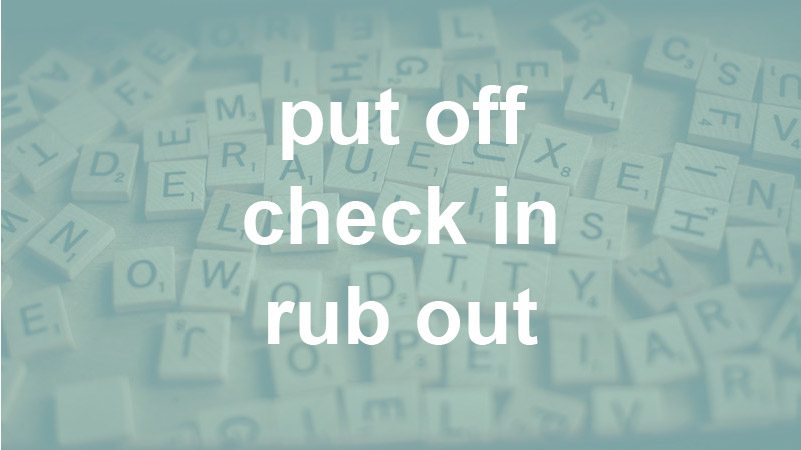Episode #7 of the course “Common English phrasal verbs: Part 1” by Angela Boothroyd
put off
1. To put off something (or put something off) is to decide to do something at a later time or date (to postpone it).
Examples of use:
a) We were going to get married in March, but we put it off until June because my grandmother was ill.
b) Can we put off the meeting until tomorrow, please? I am very busy today.
2. To put off someone (or put someone off) is to delay seeing them or doing something for them.
Examples of use:
a) I don’t want to see the salesman today. Can you put him off until next week?
b) My parents were coming to visit this week, but we had to put them off because our heating is broken.
This phrasal verb has other meanings
check in
1. To check in is to show your ticket at an airport so that the airline knows you have arrived, and they can put your bags on the aircraft.
Examples of use:
a) We have to check in at 8 o’clock.
b) Please check in at least one hour before your flight leaves.
The check-in (noun) is the place at the airport where you show your ticket and let the airline know that you have arrived.
2. To check in (or check into something) is to arrive at a hotel reception desk and tell the hotel staff who you are, and collect your room key.
Examples of use:
a) We need to check into our hotel before 10pm.
b) I’ll meet you in the hotel restaurant in 10 minutes. I’ll just check in and put my suitcase in my room.
c) Where’s dad?
He’s checking in and collecting our room keys.
rub out
To rub out something (or rub something out) is to remove writing from a surface by rubbing or wiping it with an eraser or a piece of cloth.
Examples of use:
a) I made a mistake so I rubbed it out.
b) You’ve made a spelling mistake here. Rub it out and correct it, please.
c) Can you rub out the writing on the board, please?
Recommended book
“Essential Idioms in English: Phrasal Verbs and Collocations” by Robert J. Dixson
Share with friends




